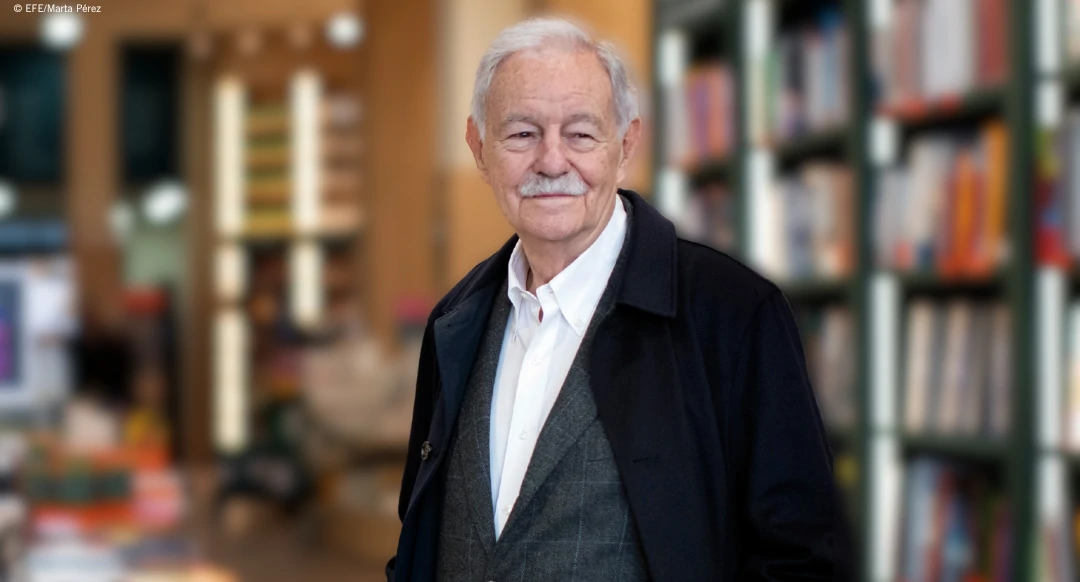Main content
Press releases
Eduardo Mendoza, Princess of Asturias Award for Literature

Spanish writer Eduardo Mendoza has been granted the 2025 Princess of Asturias Award for Literature, as announced today by the Jury responsible for conferring said Award.
The Jury for this Award –convened by the Princess of Asturias Foundation– was chaired by Santiago Muñoz Machado and composed of Xuan Bello Fernández, María Sheila Cremaschi, María Dueñas Vinuesa, Jesús García Calero, Pablo Gil Cuevas, Francisco Goyanes Martínez, Lola Larumbe Doral, Inés Martín Rodrigo, Ana Santos Aramburo, Marisol Schulz Manaut, Sergio Vila-Sanjuán Robert and Fernando Rodríguez Lafuente (as acting secretary).
This candidature was put forward by Alejandro Nuevo Gómez, Director of Spain’s National Sculpture Museum.
Eduardo Mendoza (Barcelona, 11th January 1943), novelist, playwright, translator and linguist, graduated in Law from the University of Barcelona in 1965. After travelling throughout Europe, he obtained a scholarship in 1966 to study Sociology in London. On returning to Barcelona in 1967, he practiced law. He subsequently moved to New York in 1973 to work as a translator for the UN, where he remained until 1982. He returned to Barcelona in 1983, where he continued his career as a simultaneous translator for international organizations based in Geneva and other cities. In 1995, he lectured in translation at Pompeu Fabra University. He is a regular contributor to numerous media outlets.
Translated into several languages, Eduardo Mendoza’s work, which is generally set in Barcelona, displays a style that blends elements of the Gothic novel, science fiction and crime novels, as well as a very personal sense of humour, satire and parody. His first novel, The Truth About the Savolta Case, was published in Spain in 1975. Turning fifty this year (2025), this work was a huge success and is considered by critics to be the first novel of the Spanish Transition. It already contains elements of Mendoza’s ability to use different discourses and narrative styles in a simple and direct manner, though one not exempt from academic terms, archaisms and popular language. Then came The Mystery of the Enchanted Crypt (1979, English edition 2008), El laberinto de las aceitunas (1982), The City of Marvels (1986, English edition 1988), La isla inaudita (1989), No Word from Gurb (1991, English edition 2007), The Year of the Flood (1992, English edition 1994), A Light Comedy (1996, English edition 2002), La aventura del tocador de señoras (2001), El último trayecto de Horacio Dos (2002) –published in instalments in El País newspaper–, Mauricio o las elecciones primarias (2006), El asombroso viaje de Pomponio Flato (2008), El enredo de la bolsa y la vida (2012), El secreto de la modelo extraviada (2015), the so-called Three Laws of Motion trilogy (Las tres leyes del movimiento (El rey recibe, 2018; El negociado del yin y el yang, 2019, and Transbordo en Moscú, 2021) and Tres enigmas para la Organización (2024). He has also written plays, in some of which his main character reappears, a nameless detective committed to a mental hospital who had appeared in The Truth About the Savolta Case. He has published essays, among which Baroja & Yo: Por qué nos quisimos tanto (2019) is worthy of note. The books The Truth About the Savolta Case, The Mystery of the Enchanted Crypt, The City of Marvels and The Year of the Flood have been adapted into films.
In addition to the Cervantes Prize (2016), among other distinctions Mendoza has received the Planeta Prize in 2010 for Riña de gatos. Madrid 1936 and, in 2015, he became the first Spaniard to receive the Kafka Prize. Already in 1976, his first novel received the Spanish Critics’ Award. He was subsequently granted the City of Barcelona Award (1987) for The City of Marvels, which also received the Best Book of the Year Award in France in 1988 and was a finalist for the Grinzane Cavour Prize, the Prix Médicis and Prix Femina. The Year of the Flood won the 3rd Edition of the Elle Magazine Readers’ Prize, and A Light Comedy garnered him France’s Best Foreign Book Award in 1998. La aventura del tocador de señoras won the Best Book of the Year Award from the Madrid Booksellers’ Guild in 2002 and he received the José Manuel Lara Foundation Award in 2007 for Mauricio o las elecciones primarias. In 2020, he won the International Barcino Historical Novel Prize for Las barbas del profeta.
As stated in the Statutes of the Foundation, the Princess of Asturias Awards are aimed at rewarding “the scientific, technical, cultural, social and humanitarian work carried out at an international level by individuals, institutions or groups of individuals or institutions”. In keeping with these principles, the Princess of Asturias Award for Literature is conferred in recognition of “the work of fostering and advancing literary creation in all its genres”.
This year, a total of 24 candidatures comprising 16 different nationalities were put forward for the Award for Literature.
This is the second of the eight Princess of Asturias Awards to be bestowed in what is now their forty-fifth year. Previously, the Princess of Asturias Award for Communication and Humanities was granted to South Korean-born German philosopher and essayist Byung-Chul Han. The corresponding Awards for Social Sciences, the Arts, Sports, Concord, Technical and Scientific Research, and International Cooperation shall be announced in the coming weeks (in the preceding order).
As is customary, the presentation of the Princess of Asturias Awards will take place in October in a solemn ceremony presided over by Their Majesties The King and Queen, accompanied by Their Royal Highnesses Leonor, Princess of Asturias, and Infanta Sofía of Spain.
Each Princess of Asturias Award comprises a Joan Miró sculpture symbolizing the Award, a diploma, an insignia and a cash prize of fifty thousand euros.
End of main content
